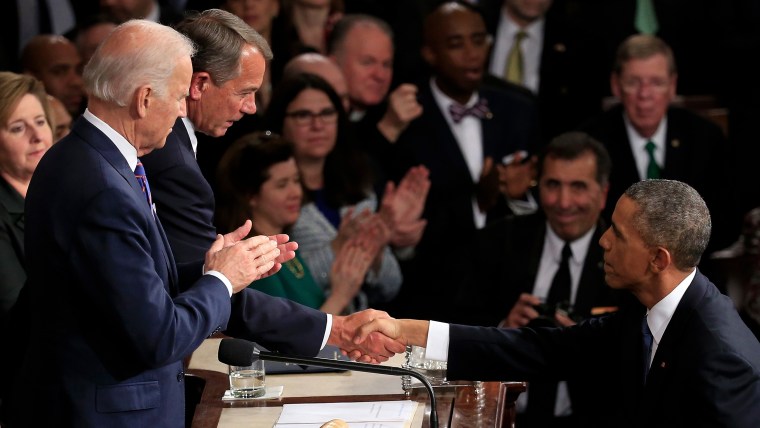The good news is, six months after President Obama launched a military offensive against ISIS targets in the Middle East, Congress is starting to debate the U.S. mission. The bad news is, the debate is off to a ridiculous start.
President Barack Obama should be asking for more power to wage war against Islamic State extremists, some Republicans on the U.S. House Foreign Affairs committee said. [...] While Republicans have repeatedly accused Obama of executive overreach in areas such as immigration, several lawmakers at the hearing questioned why he wasn't seeking broader authority this time.
You've probably heard that the GOP is outraged by the White House's proposed Authorization for the Use of Military Force (AUMF), but it's important to understand why.
About a year ago, the Republican condemnation of President Obama shifted -- "he doesn't lead enough" was out, "he leads too much" was in. The more Obama's policy agenda succeeded in practical terms, the more the GOP argued the president is a lawless, out-of-control tyrannical dictator, hell bent on limitless power without regard for the Constitution.
This week, however, Republicans are disgusted by Obama's lack of executive overreach. GOP lawmakers are suddenly convinced the tyrannical dictator needs even more sweeping powers to act unilaterally in matters of life and death.
House Speaker John Boehner (R-Ohio), who occasionally pretends to believe his party's talking points, expressed dismay yesterday that the president's AUMF would "tie his hands even further." Congress' top lawmaker apparently hopes for a more diminished role for Congress.
This isn't so much an example of Republicans temporarily putting aside their principles for the sake of convenience. Rather, it's fresh evidence that the principles themselves have always been a mirage.
Republicans think Obama must stop acting like a dictator and start working with Congress as the Constitution intended -- unless we're talking about wars, in which case Obama should go ahead and circumvent Congress as much as possible.
Republicans think higher deficits are an economic scourge -- unless deficit financing advances conservative policy goals, in which case budget shortfalls are better left ignored.
Republicans think government spending is inherently wasteful and counter-productive -- unless the investments are directed at their state and/or their policy priorities, in which case government spending is great.
Republicans think the big federal government shouldn't interfere with local decision making -- unless the residents of the District of Columbia make a decision the right disagrees with.
Republicans think Congress should take a leading role in economic policy -- unless we're talking about trade authority, in which case it's time to curtail Congress' influence and empower the lawless White House to do as it pleases.
We're talking about leaders of principle -- weak, malleable, and ultimately hollow principles.
The point, of course, is that Republican principles aren't to be taken seriously. Indeed, Republicans don't take them seriously. When Obama takes executive action on immigration and the GOP goes berserk, it has nothing to do with "overreach" and everything to do with Republican opposition to immigration.
The same can be said for executive actions on the minimum wage. And health care. And the environment. And on and on. Fealty to separation of powers and checks and balances is nice, but GOP lawmakers have made clear that when it comes to the issues they care about, sweeping, unilateral actions from the White House are just fine.
And so, as the debate over authorizing the mission against ISIS continues, expect to see congressional Republicans stress one point above all others: extending as much unilateral power as possible to the executive, the usual anti-Obama talking points notwithstanding.
